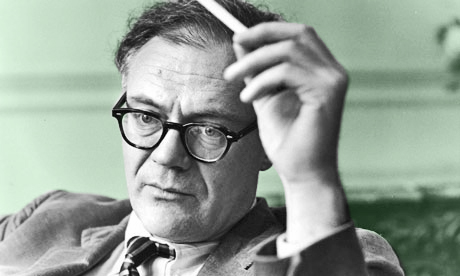
1947 marked a year of accomplishment in the career of poet Robert Lowell. He was awarded the Pulitzer for his work Lord Weary’s Castle, and earned the Guggenheim fellowship. His personal life was, in other ways, falling apart; his marriage to Jean Stafford grew increasingly strained while he developed romantic attachments to two other women, Elizabeth Bishop and Carley Dawson (who he addresses below). This was also a time when he began doubting the tenets of the Roman Catholic faith, to which to he had converted from his family’s Boston-Brahmin Anglicanism. However much Lowell slackened his religious devotions, one is left thinking that his experiences inside the confessional booth influenced the stark honesty of his poetry; the “confessional” movement would later gain its name from M.L. Rosenthal’s review of Lowell’s Life Studies in 1959.
[March 24 or 25., 1948]
Dearest Carley:
You’re a hell of a correspondent—I mean, what a wonderful one I’ve been— as far as stamps, ink and paper go.
I’ve just been to Tenebrae at the Cathedral—a choir of Franciscans in their order’s brown, starched white ropes looped downwards, awkward gangling young men, looking like minor employees at the Library. And the psalms and lamentations were good, and I thought: “Why should anyone, who wants to believe, have much trouble?” And I was in the middle of the sermon, the grim pomposity of the Irish-American voice (…they’re about 20 million too many; what a benign, cultured old world country this would be if they were all illiterate mutes)
. . . and right then and there it was
A bitter thing for Judas lscariot
And right then and there . . .
And right then and there . . .
And right then and there etc . . .
“That heart was a reeking cess-pool. My dearest brethren, you might think Judas Iscariot was in a class by himself, apart from all betrayers and murderers.”
At this point, fresh from Murder for Profit, I almost commented out loud: “What about bath-tub Smith and the homosexual Haarmann.” I was prepared. No I wasn’t!
“No, my dearest brethren, Judas Iscariot is not unique.”
Guess who?
“All who willingly sleep through Sunday Mass (looking at the green leaves and listening to the cardinals and reading the funnies with a word or a look for their friends at nine o’clock breakfast)
“All who willingly eat meat on Fridays.” This is the gospel truth.
You won’t have a personal word from me till you write.
your faithful correspondent,
Robert
From Words in Air: The Complete Correspondence Between Elizabeth Bishop and Robert Lowell. Edited by Thomas Travisano with Saskia Hamilton. New York: Farrar, Strauss & Giroux (2010), p. 847.
FURTHER READING
“To Speak of Woe That Is in Marriage,” a poem written much later in Lowell’s career but drawn in part from his experience with Stafford.
His enduring legacy as a poet, particularly in America.
Influence on the Boston trio (confessional group of poets including Sylvia Plath and Anne Sexton).


